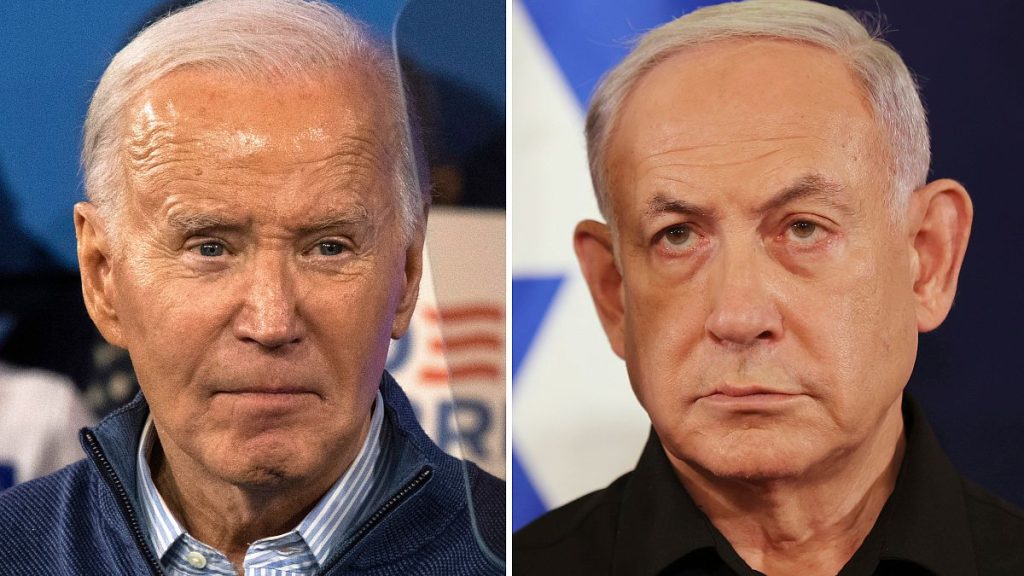US President Joe Biden and Israeli Prime Minister Benjamin Netanyahu spoke about their concerns regarding a possible invasion of Rafah in Gaza. This move, which would affect over 1 million civilians currently seeking shelter in the city, is strongly opposed by the US on humanitarian grounds. Biden reiterated his stance on Rafah during the call, highlighting the importance of protecting innocent civilians in the midst of conflict. This conversation between Biden and Netanyahu comes at a critical time as tensions in the region continue to escalate, with both leaders expressing their positions on the situation.
Netanyahu delivered a fiery speech on Sunday, rejecting international pressure to end the war in Gaza. He emphasized Israel’s determination to defend itself, stating that no amount of pressure or international decisions would sway the country from protecting its borders and citizens. The Israeli Prime Minister’s defiant stance was made clear in his speech on the country’s annual Holocaust memorial day, invoking the historical significance of resilience in the face of adversity. Netanyahu’s comments echoed the sentiment that Israel will not back down in the face of threats, highlighting the ongoing conflict and the gravity of the situation in Gaza and surrounding areas.
The US has expressed concerns about the potential impact of an invasion on Rafah, where many civilians are seeking refuge after months of conflict sparked by Hamas’ attack on Israel. Biden’s conversation with Netanyahu underlines the importance of addressing humanitarian needs and protecting innocent civilians in the region. This dialogue between the US President and Israeli Prime Minister reflects the complexities of the situation and the challenges of balancing security interests with humanitarian considerations in conflict zones. The ongoing conflict in Gaza has created a sense of urgency for diplomatic efforts to prevent further escalation and protect vulnerable populations.
The escalating tensions in Gaza were highlighted by recent incidents, including Hamas firing rockets at Israeli troops near the border and Israeli airstrikes in Rafah resulting in civilian casualties. These events underscore the volatile nature of the conflict and the human cost of continued violence in the region. The loss of life, including children and infants, is a tragic reminder of the toll that conflict takes on innocent civilians caught in the crossfire. The international community has a responsibility to address the root causes of the conflict, promote dialogue, and support efforts to end the violence in Gaza and promote peace in the region.
The upcoming meeting between Biden and King Abdullah II of Jordan further underscores the importance of diplomatic engagement and international cooperation in addressing the crisis in Gaza. The US President’s discussion with the Jordanian leader is expected to focus on strategies for de-escalation, humanitarian assistance, and long-term peace efforts in the region. Jordan’s role as a key regional partner in promoting stability and security in the Middle East adds an additional layer of significance to the meeting, highlighting the interconnected nature of regional politics and the need for multilateral approaches to conflict resolution.
In conclusion, the situation in Gaza remains a pressing concern for the international community, with the US and Israel grappling with the challenges of balancing security priorities with humanitarian considerations. The conflict in Gaza underscores the complexities of modern warfare and the impact on civilian populations, highlighting the need for diplomatic efforts to prevent further escalation and protect vulnerable communities. The upcoming discussions between Biden, Netanyahu, and other regional leaders offer an opportunity to address the root causes of the conflict, promote dialogue, and advance peace efforts in the region. As the crisis in Gaza continues to unfold, international engagement and coordinated action will be essential in fostering stability, addressing human rights concerns, and working towards a lasting resolution to the conflict.













